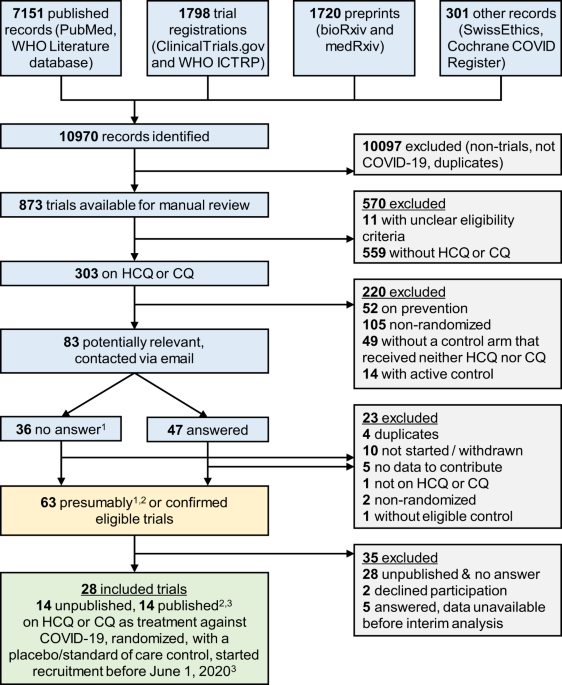It's not quantity, it's quality. The middle link there is a bad study (or at least not what I'm looking for). The 4 main studies aren't very good. 1st one had a rather high dosage for HCQ plus it was testing to see if HCQ group would have less infections. 2nd study was extremely underpowered with literally just 8 people testing positive for covid. 3rd study was for prophylaxis purposes. 4th study was for, again, trying to prevent infection.
And this is why you are full of shit. It's not just the fact that you're pulling complaints about studies you don't really understand out of your arse, it's that you've only turned on some facsimile of critical analysis for the studies going against you. Had you employed the same skepticism in the first place at the mass of frankly terrible positive HCQ studies (that even now you either cannot or will not scrutinise to realise their overall awfulness), you'd never have deluded yourself it did any good in the first place.
Unfortunately, you did delude yourself. And rather than do the logical thing of backing down in the face of superior evidence, you're still here trying to prop up that delusion. You're really doing this for ego, because a) you've invested so much in trying to argue it does anything that you don't want to admit all that time and effort was wasted, b) you're clearly very proud of yourself (constantly boasting about being right all the time) and you don't want that spoiled and c) the oppositional nature of debate makes you too proud to admit defeat to the "enemy" (i.e. everyone else in this thread).
I never claimed prophylaxis would by a thing HCQ did nor would it reduce infections, IT'S NOT AN ANTIVIRAL.
Oh yes you did claim it was an antiviral,
even if you did not realise that was what you were doing. This is what I am pointing out to you.
It might in fact be an antiviral - at least for some viruses, and at high enough doses. Evidence suggests that it has insufficient antiviral activity against SARS-CoV-2, though. There is a actually a paper somewhere speculating why it might not be effective against SARS-CoV-2 - something to do with pH and lysosomes if I remember rightly.
Let's also bring back the fundamental problem (already pointed out some weeks/months ago) here that you claim that HCQ is not an antiviral, yet you are proposing it is clinically useful in a phase of the disease where it would be beneficial
because it is an antiviral! You have a fundamental mismatch between your claims about its mechanism of action and its clinical use. Which you would realise if you actually understood what was going on.
My claim is that HCQ will help prevent hospitalizations, not stop infections from occurring. 3rd link is about mortality with regards to HCQ, which features the Recovery and Solidarity trials, and I said you don't give HCQ to hospitalized patients just like you don't give steroids to people who just tested positive for covid either. Your statement the HCQ yields higher mortality is because all your sources include giving it to patients that shouldn't get it in the 1st place. What's the mortality for those getting HCQ EARLY and a PROPER dose vs those not getting anything early? Give me a study on that. The 1st link (BMJ) has a section for hospital admission but all the studies they reference for hospital admission literally provide no data for how many of each group (HCQ or control) needed to be hospitalized and the Egypt study is not available or removed.
And the evidence does not support your claim, but you are not willing or capable of assessing the body of literature to come to a reasonable conclusion. See above.
Giving someone a toxic dose of something is not a good study.
It is if that's the dose needed for an adequate therapeutic response.
Don't blame me for your poor logic. You've still given me nothing on why you would vaccinated someone that already had covid (assuming they have a normal working immune system). You've just said covid is not chicken pox, therefore I'm smarter than you and I win. That's not an argument.
Dude, it's not poor logic to point out the sheer irrationality of assuming that what goes for one disease goes for another. They are different diseases with different circumstances therefore requiring different public health strategies.
Also, there's
a recent preprint come out that suggests immunity - at least in a substantial minority individuals - might be substantially weaker or less long-lasting than we might hope and they are particularly more susceptible to variants, thus reinforcing the idea that vaccination is a good idea even for those who have been infected. Just to point out this matter is far less settled and certain than you want to present it as with your over-optimistic assessments: that's why scientists are still studying this.

www.bmj.com

journals.plos.org

www.nature.com

